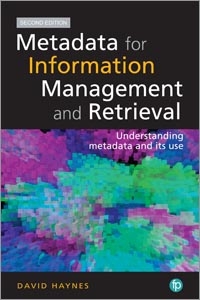
Primary tabs
You don't need to be an ALA Member to purchase from the ALA Store, but you'll be asked to create an online account/profile during the checkout to proceed. This Web Account is for both Members and non-Members.
If you are Tax-Exempt, please verify that your account is currently set up as exempt before placing your order, as our new fulfillment center will need current documentation. Learn how to verify here.
- Description
- Table of Contents
- About the author
- Reviews
Metadata for Information Management and Retrieval has been fully revised by David Haynes to bring it up to date with new technology and standards. The new edition, containing new chapters on Metadata Standards and Encoding Schemes, assesses the current theory and practice of metadata and examines key developments in terms of both policy and technology. Coverage includes:
- an introduction to the concept of metadata;
- a description of the main components of metadata systems and standards;
- an overview of the scope of metadata and its applications;
- a description of typical information retrieval issues in corporate and research environments;
- a demonstration of ways in which metadata is used to improve retrieval;
- a look at ways in which metadata is used to manage information; and
- consideration of the role of metadata in information governance.
This book is essential reading for library and information students at undergraduate and postgraduate level and will also be useful reading for LIS professionals looking for an accessible introduction to metadata.
Examination copies are available for instructors who are interested in adopting this title for course use.
List of figures and tables
Preface
Acknowledgements
PART I: METADATA CONCEPTS
1. Introduction
2. Defining, describing and expressing metadata
3. Data modelling
4. Metadata Standards
PART II: PURPOSES OF METADATA
5. Resource identitification and description (Purpose 1)
6. Retrieving information (Purpose 2)
7. Managing information resources (Purpose 3)
8. Managing intellectual property rights (Purpose 4)
9. Supporting e-commerce and e-government (Purpose 5)
10. Information governance (Purpose 6)
PART III: MANAGING METADATA
11. Managing metadata
12. Taxonomies and encoding schemes
13. Very large data collections
14. Politics and ethics of metadata
Index
David Haynes
David Haynes PhD MBCS FCLIP conducts research into Privacy and Metadata at the Department of Library and Information Science at City, University of London. He is also an Honorary Tutor at the Centre for Archives and Information Studies (CAIS) at the University of Dundee where he specialises in Metadata and Taxonomies. He has been involved in library and information consultancy and research for more than 35 years during which time he has worked on information retrieval, information policy and information governance issues, latterly specializing in privacy and data protection. He is Chair of the UK Chapter of ISKO, the International Society for Knowledge Organization.
"A concise introduction to what metadata is and the variety of uses to which it can be applied."
—Technical Services Quarterly
"Will serve those seeking better understanding of traditional metadata ideas as well as those exploring emerging metadata concepts. The first edition was considered a classic resource and this edition likely will attain the same status."
—Technicalities
"Metadata has evolved from being a specialist interest to become a mainstream topic of relevance to anyone concerned with accurate and efficient information management. David Haynes has produced a clear, comprehensive and timely overview of how metadata shapes our digital age, why it’s a key organisational asset and how its value can be released through the use of key standards and technologies."
—Neil Wilson, Head, Collection Metadata, The British Library
"David Haynes’ Metadata for Information Management and Retrieval provides an excellent overview that covers all of the main issues relating to metadata and controlled vocabularies. Haynes deals with key concepts such as resource description and information retrieval in clear, practical terms, with real-life examples. The section on the politics and ethics of metadata is timely and thought-provoking. This book is a valuable resource for both students and information professionals in the age of digital libraries and big data."
—Murtha Baca, PhD, Editor, Introduction to Metadata
"This second and timely expanded edition of Metadata for Information Management and Retrieval covers, in a very accessible and straightforward language, all the fundamental points which explain why metadata is so relevant in today's electronic environment. By approaching the theme from different although complementary angles, Dr. Haynes’ book makes the concept of metadata comprehensible to everyone, shedding a new light on the management and curation of digital objects. This book is an indispensable guide to be placed on our shelves!'"
—Dr. Aquiles Brayner, Digital Curator
"David Haynes’ book presents a highly qualified and useful introduction to metadata and deserves to be used as a text in courses at iSchools and by professionals working in museums, libraries, archives, publishing houses and other contexts."
—Birger Hjørland, Professor of Knowledge Organization, Royal School of Library and Information Science, Copenhagen
Review of the previous edition:
"A very sound introduction to current metadata concepts for librarians and information workers alike. There is no doubt that it is already a key text on Library and Information Science courses and will remain so for many years."
—Marieke Guy, Ariadne


